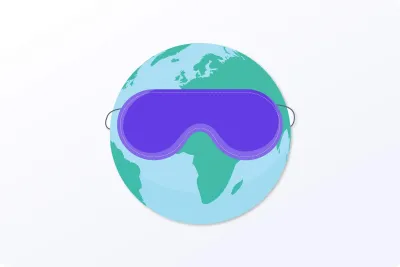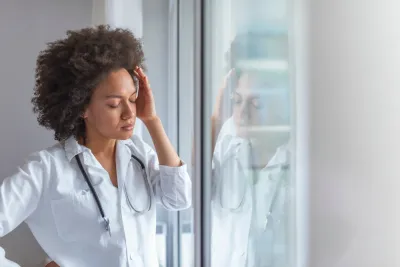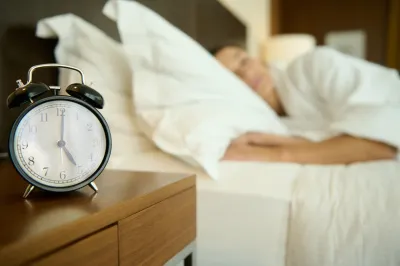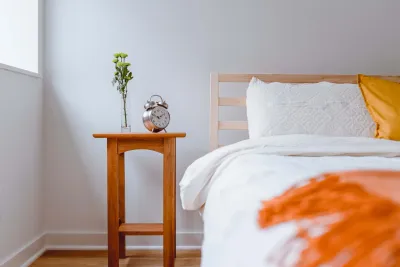Celebrating World Sleep Day: Importance and Insights
Ana Marie Schick: Resident Sleep Expert and Certified Health Coach • Mar 03, 2025

Key Takeaways
- Global Focus: World Sleep Day spotlights the importance of healthy sleep and its impact on overall well-being.
- Annual Reminder: Celebrated every March, it’s a call to prioritize rest just like diet and exercise.
- Sleep Awareness: Poor sleep contributes to major health issues like heart disease, obesity, and mental health challenges.
- Action Steps: Improving sleep hygiene, sticking to consistent schedules, and creating an optimal sleep environment make a real difference.
- Technology Support: Smart sleep systems, such as the Chilipad Dock Pro, help you personalize sleep temperature for deeper, restorative rest.
We hope you plan to join us in recognition of World Sleep Day® on March 14, 2025! Scheduled on the Friday prior to the Spring Vernal Equinox each year (and a convenient reminder to get good sleep over the weekend).
Interestingly, National Sleep Awareness Week in the U.S. is from March 10-16, which overlaps World Sleep Day®.
So, today, it’s important to prioritize healthy sleep, maybe for the weekend or, better yet, every day!
Don't Let Temperature Affect Your Sleep
The Chilipad Dock Pro offers dual-side temperature zones, so you and your partner can comfortably choose your preferred sleep temperature without affecting the other person ranging from 55-115ºF.
What is World Sleep Day?
World Sleep Day 2025 is an annual event hosted by the World Sleep Society since 2008. It’s intended to celebrate sleep and focus on easing the burden of sleep concerns on society through better management and prevention of sleep disorders.
Since 2008, World Sleep Day has drawn attention from celebrities and media around the world and more than 88 countries have participated.
The 2025 Theme
The theme for this World Sleep Day is Make Sleep Health. Priority. Sleep is important to health, but measurable differences in sleep health persist across populations worldwide, creating additional burdens and reinforcing health inequities.
The importance of sleep cannot be overstated when it comes to maintaining good health. However, it is a known fact that there are significant differences in sleep health across various populations and regions worldwide.
These differences could create additional burdens and reinforce existing health disparities, leading to a lack of sleep equity. Therefore, this year's World Sleep Day aims to highlight the importance of addressing these differences and promoting sleep equity for better global health outcomes.
The timing for this event aligns with the beginning of daylight savings time (DST), a time practice that can be disruptive to sleep and circadian timing.
General Sleep Information:
- Most sleep disorders are treatable or preventable, yet less than one-third of the individuals seek professional help. [1]
- Sleep problems constitute a global epidemic that threatens health and quality of life for up to 45% of the world’s population. [2]
- Lack of sleep is related to depression, anxiety, and psychosis. [3]
- About 75% of adults with depression [4] suffer from insomnia.
- 6.1 out of 10 is the rating U.S. adults give their sleep quality. [[5]]
- 40% of U.S. adults sleep less than seven hours per night. [6]
- 55% of adults typically take more than 20 minutes to fall asleep. [7]
- About 1 out of 4 married couples sleep in separate beds. [8]
Over the last few years, sleep has become a more prevalent topic in medical communities and, more importantly, in everyday discussions. Thanks to an increase in scholarly interest in sleep, sleep disorders, and sleep's impacts on health, the number of papers and studies on the subject each year has increased exponentially.
Sleep Study
According to a 2017 study, <a href="#reference9">[9]</a> the number of Sleep fellowship programs has increased by 12% since 2012. The number of applicants to these programs increased by 38%, and slots filled have increased by 7%. The short of it is that more medical students are pursuing sleep medicine than ever.
Simple Sleep Tips
The link between sleep and health is universally known. Besides lowering the risk for serious health problems (like heart disease and diabetes), sleep reduces stress levels and improves overall mood.
Below are three easy tips to simply improve your sleep:
- Stick to a sleep schedule. According to the Sleep Foundation, the timing of sleep does matter. Sticking to a schedule makes us more likely to get better quality rest.
- Make your bedroom a sanctuary. It goes without saying when we are in an environment where we are comfortable and with few distractions, we will sleep better. Check out our Feng Shui blog for more on how to make your bedroom the rest oasis you deserve!
- Sleep at your ideal temperature. Science proves we sleep better when we sleep at the right temperature. It may vary a few degrees from person to person, but for the most part, it's on the cooler side. A bedroom that is too warm can seriously impact falling asleep and staying asleep.
The Importance of Sleep
According to Dr. Mathias Basner of the University of Pennsylvania Perelman School of Medicine in Philadelphia, “People are slowly getting it. We're getting more interested in sleep.” [10] This growing interest in sleep among those of us without an MD or a bunch of other letters after our name could be due to celebrities, athletes, and entrepreneurs attributing sleep as one of their keys to success.
National Sleep Awareness
As stated above, sleep is important for everyone every day! Unfortunately, modern conveniences like electricity and electronic devices (e.g., phones, and TVs) have changed our sleep patterns and habits. We no longer go to sleep at sundown or rise in the morning with the sun. We work, play, and sleep at all hours of the day…and night.
Hence, as study findings highlight poorer sleep in the U.S., we need to become more intentional about our sleep. Awareness campaigns are one way of reminding us to do that.
Sleep Awareness Week
National Sleep Awareness Week© takes place March 10 - 16, 2025, and is spearheaded by the National Sleep Foundation (NSF), a 501(C)3 nonprofit corporation in the U.S. Started in 1998. Sleep Awareness Week is part of a targeted public health education campaign focused on sleep awareness.
Sleep Study
Research indicates that the quality of our sleep has a more significant impact on our quality of life and daytime performance than the quantity of sleep we get. <a href="#reference11">[11]</a> Broken down, this means it's not always about the hours but about the type of sleep we get.
National Napping Day
Celebrated on March 11th, National Napping Day is supposed to help you “catch up” on the hours of sleep lost due to the change in daylight saving time. A Boston University professor created National Napping Day in 1999 to heighten awareness of the importance and benefits of sleep. [12] It's important to understand the different types of naps and their potential effects.
Mimicking the Spanish “siesta” or afternoon nap tradition, a midday nap was quite common before the Industrial Revolution. While naps may not be the best sleep strategy for people struggling with disturbed sleep, a short 20-minute nap can be beneficial! [13]
Get Cooler Sleep
At Sleepme, we aim to promote best practices and offer a variety of ways to promote quality sleep for all. Check out our products below for more information. Our bed cooling systems can help you stay cool under the covers all night long and get deeper, more restorative sleep.
Read More: Benefits of Sleeping in Cooler Temperatures: Why It's Good for You?
Greatest product ever! No more night sweats! No more being up all night. Having consistent, solid sleep EVERY night!!!
Greg A
Sleepme Customer, Google Review
Chilipad Dock Pro
Convinced there’s nothing that can keep you cool? We doubled the cold power just for you. Chilipad Dock Pro is the best cooling mattress pad! It's the coldest, quietest, and most comfortable bed pad available!
Rapidly cool down if you're a hot sleeper with our advanced cooling technology, which offers 5x more cooling contact. Research the science of sleep, talk to your doctor, find sleep solutions that work for you and share them. Don't be afraid to invest in your sleep!
Read our blog, Why Do I Get Hot When I Sleep? The Top Reasons & Solutions to discover more about why you might be sleeping hot and how to manage it.
The Cube
Discover your perfect temperature for deep sleep. With the Cube, the original cooling bed pad for your bed, you can set it and forget it. This bed cooling system provides an easy way to sleep at your ideal temperature all night long. Just plug it in, fill it with water and set your temperature on the device or remote; that’s it! Hello, cooler sleep!
Final Thought As we celebrate World Sleep Day, let's remember the immense importance of sleep in our lives. This day not only brings awareness but also encourages us to take actionable steps toward improving our sleep health.
Embracing the knowledge and tips above can lead us to better sleep habits, ultimately enhancing our overall well-being. Let's commit to making sleep a priority today and every day.
References
[1] Léger, D., & Bayon, V. (2010). Societal costs of insomnia. Sleep medicine reviews, 14(6), 379–389
[2] Stranges, S., Tigbe, W., Gómez-Olivé, F. X., Thorogood, M., & Kandala, N. B. (2012). Sleep problems: an emerging global epidemic? Findings from the INDEPTH WHO-SAGE study among more than 40,000 older adults from 8 countries across Africa and Asia. Sleep, 35(8), 1173–1181
[3] Riemann, D. Krone, L.B., Wulff, K., & Nissen, C. (2020). Sleep, insomnia, and depression: Review. Neuropsychopharmacology 45, 74-89. View Study
[4]Beusterien KM, Rogers AE, Walslenben J et al. Health related quality of life effects of modafinil for treatment of narcolepsy. Sleep 1999; 22(6): 757-765
[5] Lindsey. “National Sleep Awareness Week: 10 Sleep Statistics You Should Know.” Nolah Mattress, 14 Mar. 2022. View Resource
[6] ibid
[7] ibid
[8] ibid
[9] Watson, N. F., Rosen, I. M., Chervin, R. D., & Board of Directors of the American Academy of Sleep Medicine (2017). The Past Is Prologue: The Future of Sleep Medicine. Journal of clinical sleep medicine : JCSM : official publication of the American
[10] Crist, Carolyn. “More U.S. Adults Losing Sleep in Recent Years.” Reuters.com, 28 Dec. 2018. View Resource
[11] Kohyama J. Which Is More Important for Health: Sleep Quantity or Sleep Quality? Children (Basel). 2021 Jun 24;8(7):542. doi: 10.3390/children8070542. PMID: 34202755; PMCID: PMC8304732
[12] Noe, Meghan. “Close Your Eyes | BU Today.” Boston University, 3 Apr. 2006. View Resource
[13] Brooks, A., & Lack, L. (2006). A brief afternoon nap following nocturnal sleep restriction: which nap duration is most recuperative? Sleep, 29(6), 831–840









